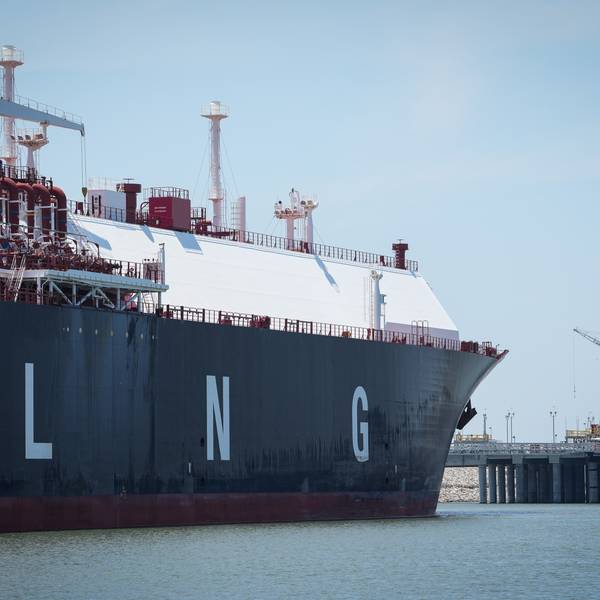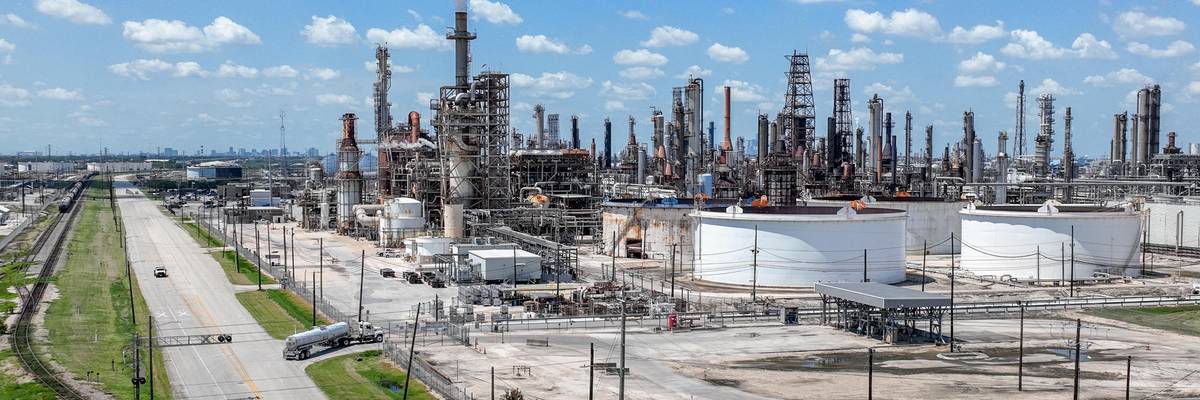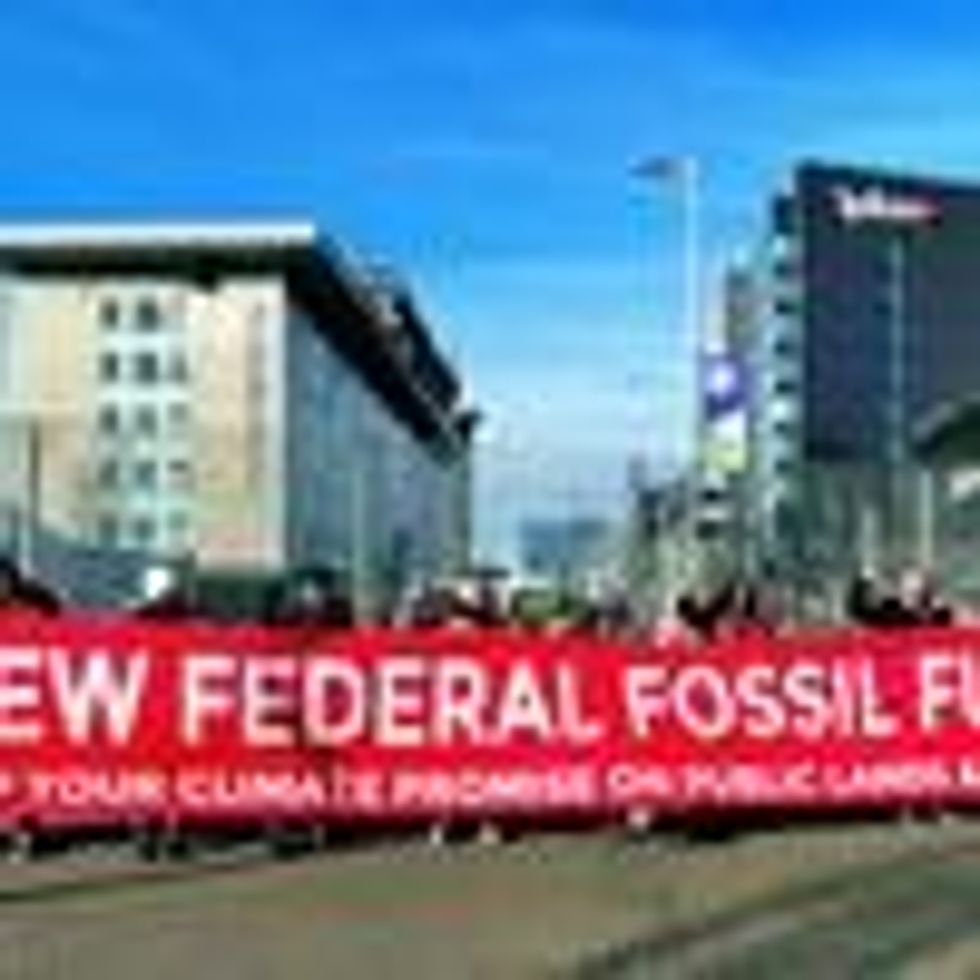Before the comment period ended on Monday, more than 50,000 individuals and 30 organizations urged the U.S. Department of Transportation's Maritime Administration to reject the application for a sprawling new oil export project in the Houston metropolitan area that would exacerbate deadly air pollution along the Texas coast while worsening the broader climate emergency.
"Choose our health and our climate over the greed of Enterprise and Enbridge."
Maritime Administrator Ann Phillips now has 45 days to submit a record of decision, in conjunction with the U.S. Coast Guard, for the deepwater port license application for the so-called Sea Port Oil Terminal (SPOT), which seeks to build new fossil fuel infrastructure in already overburdened communities in Harris and Brazoria counties despite climate scientists' repeated warnings that doing so is incompatible with preserving a livable planet.
SPOT "is an archaic project" that "must be stopped," Sue Page, a resident of Surfside Beach in Brazoria County, said in a statement. "To build infrastructure for almost 100 miles on land and offshore and tear through important ecosystems, wildlife habitats, and my own home in Surfside Beach is wrong."
The proposed terminal is bound to lead to "oil spills and leaks, noise pollution, [and] diminished and harmful air quality," said Page, who added that the "true cost" of the project "is my community's health and well-being."
Earthworks, one of the groups that submitted comments highly critical of the federal government's environmental impact statement (EIS), summarized the likely consequences of the project:
Proposed by Enterprise and Enbridge, SPOT would export 2 million barrels of domestic crude oil per day for global export via Very Large Crude Carriers (VLCC). The project would increase toxic air pollution in the Houston-Galveston-Brazoria region, which already suffers from air quality that fails to meet [Environmental Protection Agency] health standards, and poses considerable risk of a major oil spill onshore and in Gulf waters that are still recovering from the 2010 BP Deepwater Horizon oil spill. Construction of pipelines threatens critically endangered Kemp's Ridley sea turtles that nest on Surfside Beach.
Gulf Coast communities are hit the hardest by the climate crisis, which is caused by emissions from fossil fuel production and use. SPOT will increase these emissions, further harming this region through climate-related disasters such as hurricanes, drought, and extreme heat. The proposed project poses a significant threat to sensitive ecosystems, fishing, hunting, cultural, and recreational resources that are endemic to the Gulf Coast and its local economy.
Melanie Oldham of Citizens for Clean Air and Water in Brazoria County implored the Biden administration to "choose our health and our climate over the greed of Enterprise and Enbridge, and deny permits to the SPOT project and all similar fossil fuel export terminals proposed in Gulf Coast communities."
Trevor Carroll, a Brazoria County Organizer at Texas Campaign for the Environment, pointed out that "Enbridge has one of the worst track records of any pipeline company in the history of this country," while "Enterprise gouged Texans to the tune of hundreds of millions during [Winter Storm] Uri," leading to higher home energy bills months later.
"These irresponsible, greedy companies cannot be allowed to build a dangerous, climate-destroying deepwater disaster along our Texas Gulf Coast," Carroll added.
According to Sierra Club attorney Rebecca McCreary, "The final EIS for the project fails to provide critical information and analyses necessary to complete environmental impact review and the Deepwater Port Act's national interest determination."
"Increasing hazardous air pollutants in the Houston-Galveston-Brazoria region... is a death sentence to the children of our community."
"The national interest in securing a clean energy future, [and] the urgent need to meaningfully address the climate crisis and lift up and protect frontline communities of color, all weigh heavily against licensing the SPOT project, which will lock in decades of fossil fuel dependence and infrastructure and pollute Gulf communities already at the frontlines of climate disaster," said McCreary.
Last decade's drilling and fracking boom turned the U.S. Southwest's Permian Basin into the most productive oil and gas field in the world, and Congress' decision to lift a ban on crude exports in late 2015 precipitated a surge in the construction of pipelines and related infrastructure throughout the Gulf Coast region.
Despite mounting evidence of the deadly toll of fossil fuels and the need to expedite a clean energy transition, President Joe Biden has yet to use his executive authority to cancel nearly two dozen fracked gas export projects that are set to unleash pollution equivalent to roughly 400 new coal-fired power plants.
Related Content
Biden to Unleash 'Irrevocable Climate Chaos' if US Fracked Gas Export Projects Proceed: Groups
Brett Wilkins
"Increasing hazardous air pollutants in the Houston-Galveston-Brazoria region," said Chrystal Beasley, a Texas Gulf Coast energy campaigner at Earthworks, "is a death sentence to the children of our community."
"It is our hope that the Biden administration will continue in their governmental oath and mission to fully evaluate the safety risk and liability to underserved communities along the Texas Gulf Coast," Beasley added, "and refrain from sacrificing our health and livelihood to benefit corporate shares."





